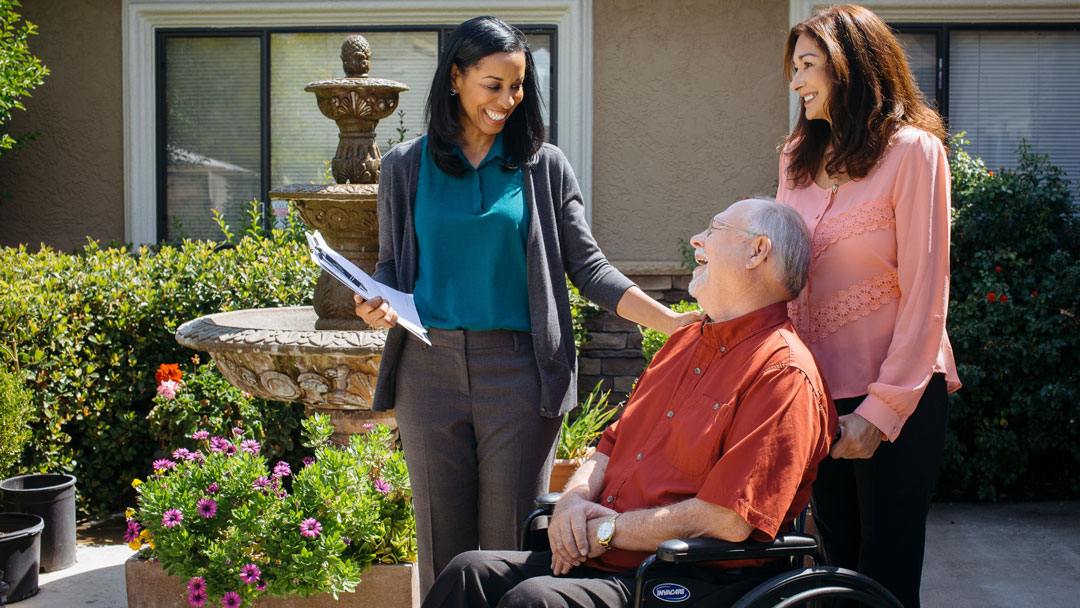Parkinson’s Disease: A Caregiver’s Approach to Intervention

Some diseases and disorders can come with age, and Parkinson’s Disease is one of these. With its unique set of challenges, patients with Parkinson’s disease require a special level of care and compassion.
Because Parkinson’s Disease can be challenging for both the patient and the caregiver, Always Best Care is here to offer support and assistance.
Let’s dig deeper and understand how to love and care for someone with Parkinson’s Disease and the essential role every caregiver fills.
Table of Contents
Understanding Parkinson’s Disease
Parkinson’s Disease (PD) is a neurodegenerative disease that causes symptoms like tremors, stiffness, and trouble balancing. It can also lead to emotional changes, mood swings, and changes in cognitive function. With its wide variety of symptoms, it can make daily life difficult.
Recognizing When to Seek Help
One of the most important ways a caregiver can look out for their patient is by recognizing the right moments to get professional help.
Any changes in symptoms or increase in symptoms warrant a discussion with your healthcare professional. The sooner the caregiver recognizes symptoms, the better. Early recognition allows for the patient to receive the necessary care as soon as possible.
Identifying the Early Signs
There are several key early signs to help you recognize both the onset of Parkinson’s Disease and an increase in disease intensity.
- Motor symptoms. These are the classic Parkinson’s symptoms, ranging from slow movement to muscle tension and loss of balance. You may notice changes in patient handwriting or slight tremors. Worsening motor symptoms may also be a sign that a patient who is already diagnosed needs to see his or her healthcare professional.
- Non-motor symptoms. Sometimes before the onset of motor symptoms, you might notice your loved ones feeling depressed or anxious, losing sleep, experiencing constipation, losing their sense of smell, or exhibiting changes in their voice. These are all early signs of Parkinson’s Disease.
- Cognitive changes. Parkinson’s patients can experience mild memory loss or some trouble problem-solving.
The Value of Early Intervention
Catching Parkinson’s early has many benefits for the patient. It allows for a reduction in symptoms, medication management, and increased quality of life.
In addition, patients who are treated early for Parkinson’s have the opportunity to work with a physical therapist, speech therapist, or occupational therapist to help improve their quality of life and symptom management.
Consulting a Specialist
An essential part of managing Parkinson’s is consulting with a licensed neurologist and receiving an official diagnosis.
This diagnosis can come through a clinical evaluation, and, in some cases, an MRI or DAT scan. Once diagnosed, your healthcare professional can help you and the patient develop a targeted, personalized plan for patient safety and symptom management.
Developing a Comprehensive Care Plan
Your care plan is one of the most important parts of your method to manage and mitigate Parkinson’s disease. It should include a variety of aspects like
- Medication. Understanding which medication or medications are right for your patient and monitoring their intake as well as symptoms in response to the medication is key.
- Therapeutic interventions. If applicable, you should seek out the necessary physical therapy and speech therapy to help make daily life more comfortable for your patient.
- Lifestyle changes. As a caregiver, it’s important to help your patient in all areas of life. Some areas where intervention can be most helpful include diet, exercise, and activities that help mitigate symptoms.
- Support services. Being a caregiver for someone with Parkinson’s can be a beautiful but tiring occupation. Whether you are a professional nurse or a loving family member, it’s important to know what support services are available, both medically and emotionally for you and your patient. This can include support groups, counseling, and other resources.
As a caregiver, your job may feel overwhelming. But always remember that your work is purposeful and meaningful. Completing small tasks like ensuring your patient takes their medication can make a world of difference.
Larger tasks like recognizing the onset of symptoms or an increase in symptoms are even more important. Caregivers are perhaps the most important part of any patient’s plan to live as normal of a life as they can.
Creating a Supportive Environment
This is because caregivers are the people who make daily life doable for people with Parkinson’s. Whether it’s by making the home safer for their patients or by spending time with them, caregivers give the necessary encouragement for Parkinson’s patients to thrive.
Two important ways that you as a caregiver can make home life easier for your patient are installing necessary home modifications, like ramps and railings, to prevent falls, and helping your patient remain as independent as possible, whether through encouragement or other positive means.
Managing Medications
Medication is an important part of managing Parkinson’s. As the caregiver, you’ll need to make sure all medications are taken on time and in proper dosages. A medication log may help you and your patient keep track of this.
Incorporating Physical Activity and Nutrition
PD patients need to take extra care of their bodies through exercise and diet. You can assist them by helping them stay on track with exercises that improve balance and mobility. These may be recommended by your physical therapist or neurologist.
A clean, healthy diet of whole grains, fruits, and vegetables can also help improve cognitive function. You’ll want to make sure your patient is eating well and taking care of his or her body.
Addressing Emotional and Cognitive Changes
It’s common for PD patients to feel depressed, anxious, or to experience emotional and cognitive changes. As a source of encouragement, you can uplift them while also keeping an eye out for any changes in their mental or emotional state.
Navigating Healthcare Appointments
Another way you can be present for your loved ones is by attending and preparing for their medical appointments together. Come prepared with updates on your patient’s health, any questions they or you might have, and any concerns. This makes the medical process so much smoother and easier for you and your patient too.
Leveraging Community Resources
For you as the caregiver, you need to take care of yourself and rest, too. That’s why it’s so important for caregivers to take advantage of community resources like counseling, educational forums, and support groups.
It’s ok to need time off, too. Your patient will only thrive under your care if you also take care of yourself. At Always Best Care, we believe in the well-being of both the patient and the caregiver, and that’s why we’re here to help.
Planning for the Future
A positive and proactive outlook for the future will make it so much easier when things change. As Parkinson’s progresses in your patient, you’ll have the ideas, tools, and resources both of you need to feel comfortable with the change.
At Always Best Care, we believe that patients and caregivers are equally important. Navigating Parkinson’s can be a challenge, but we’re here to stand by your side and support you. You don’t have to be intimidated by helping those you love. Allow us to ease the burden and guide the way for patient and caregiver well-being.
Enhance Safety and Comfort for Your Loved One with Parikinson’s Today!
Always Best Care provides quality senior services tailored to your needs and abilities. Located at 860 Tabor St STE 101, Lakewood, CO 80401, United States, contact us today at +1 720-310-6998 to schedule a care consultation and learn how we can assist you in safely and comfortably aging in place!





